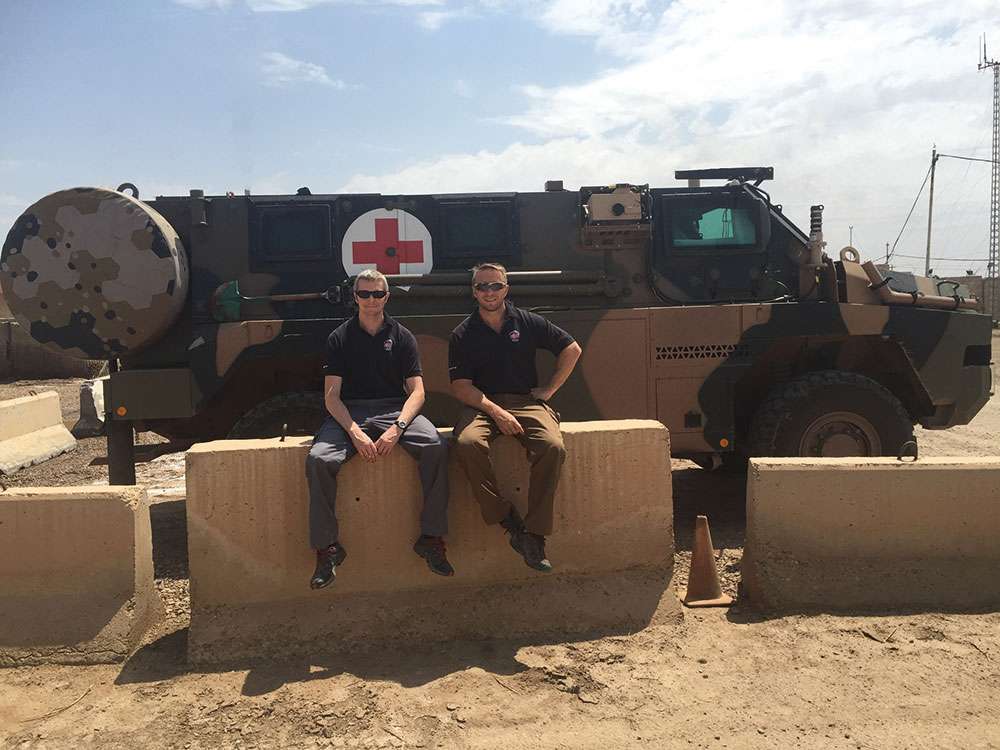
Iraq – Myself and fellow medic beside Australian military field ambulance
I was brought up near Bristol and when I was very young I didn’t have any aspirations towards anything medical. Despite having no military background all I wanted to do was join the Army, I just liked the idea. I would read books about the Army which I enjoyed. I joined the Army cadets as a young teenager and this inspired me even more. I joined the Royal Signals at the age of 18 just after I finished my A levels. My primary role was as a signaller but I cross trained as a medic. So I had responsibilities to treat my team if they became injured in the field. The medic’s course was excellent and heightened my interest in all things medical. The course was an intense month of classroom training followed by a month in hospital, gaining practical experience.
During my time in the army, I was deployed a couple of times to Bosnia, but it wasn’t a combat role it was more of an observer and peacekeeper role. The conflict there had finished in 1995 so most of it then was managing the UN mandate post-conflict. The army gave me the opportunity to operate in many different environments including the jungle and desert.
My medical role became my main interest, so I had to decide whether to transfer over to the medical corps, or leave and join the ambulance service. So I finally decided in 2002 to leave the Army and become a paramedic by joining the ambulance service in Norfolk. The change in role was very different as it’s a civilian organisation and doesn’t have the same comradery as the Army.
At the time ambulance training was based around residential courses. Initial training is as an Emergency Medical Technician. We undertook residential courses for about 10 weeks and an advanced driving course for blue-light driving safety. This isn’t all about driving fast, but making progress safely. As you gain more experience, you move onto rapid response cars after further training. Several trainees don’t make it through the driving course, because they can’t grasp it. It’s a big part of the job so absolutely essential.
In my course, once the initial training was completed you were placed with a crew, not as a third person but as part of that crew, under the wing of a senior veteran as it were. When I first came across a scene I hadn’t seen before I would worry. Then we had a phone but it’s different now, we have radios that go off. We would dread the phone ringing as there was no way of knowing what you’d be going to and whether you’d cope with it. In time you see more and more incidents and gain experience and confidence in dealing with them. At the outset everything tends to be a concern.
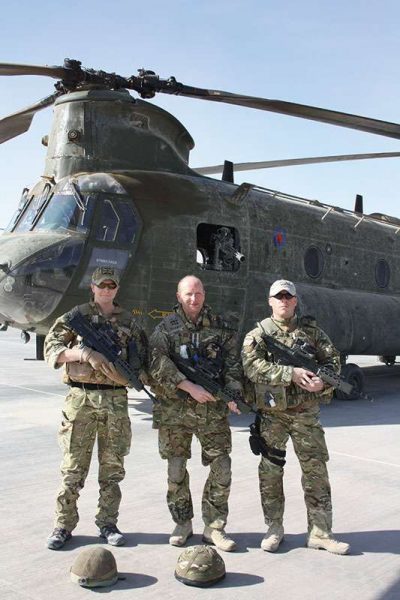
Myself and fellow Paramedics beside the MERT helicopter – Afghanistan
There were incidents like a cardiac arrest. We would do our best and give 20 minutes of advanced life-support and go through the procedures. After that once we’d satisfied certain criteria then we would stop. Sadly then we would have to inform the family which can obviously be quite stressful. There’s really no training that can prepare you for that.
After a probationary year, if you meet requirements you are put forward to be a paramedic. When I was training the course was changing to the university-driven system, so as one of the early paramedics I did half university and half residential.
It’s a new profession really and has changed quite a bit in a short space of time. We are asked to do more and more things and the knowledge-base and the skill set needs to increase to accommodate that. These days to become a paramedic it’s a university course, a threeyear degree programme.
I remained in the East of England until 2009 and was progressing quite well. In the background I joined the reserves again. I had seen Afghanistan on the TV news and thought it looked quite interesting. I felt I was missing out. I knew a few guys that were going out to Afghanistan and found out through a friend that the Royal Air Force were looking for paramedics so I decided to
return to working with the military.
Prior to deploying I had to undergo more training, as the work was more specialised than on an ambulance. The Medical Emergency Response Team (M.E.R.T.) is Doctor lead, has two paramedics and a nurse, so it’s more like a hospital team in a sense, but operates from the back of a helicopter. We spent a lot of time practicing how to anesthetise patients and advanced trauma skills, chest drains and using different drugs. The team trained together so procedures become second nature because when you’re in the air the helicopter is very noisy, you can’t hear properly and it’s a confusing environment. The training makes it quite intuitive.

Iraq – Myself next to the helipad
When we went out to Afghanistan we were based in Bastion. We were attached to the UK hospital there where the majority of our casualties came. The tours last 3 months and I did 2 in the end. There are 2 teams, who work 24-hour shifts. Even when not working you are on standby anyway, so we stayed in a group of 4 constantly. Working 24 hours you might see 2-3 jobs in a day, maybe one job in the night. There are tents by the flight line where we would sleep so when the radio call came we would jump straight into the helicopter, a couple of hundred meters away. It felt similar to Battle of Britain type stuff because the air crews run out to the aircraft when scrambled.
My first week was quite tame really, there was maybe one proper job a day. But then about 2 weeks later the Americans took over in Sangin province and all hell broke loose. We started to take large casualty numbers.
Literally every day we were flying in several times picking up mass casualties, helping up to 6 patients in a lift, plus the 4 medics, 4 Air Crew and 4 man security detail. It could get quite busy in the back of the helicopter!
There were also some army guys with us as protection. We sometimes came under fire, especially when the Americans were involved. The British were much more protective of their assets, so if they took a casualty, unless they were completely pinned down, they would move that casualty to a safer area, just a few hundred meters back. Whereas the Americans tended to call us right into the middle of what was going on. That was bad because people were shooting at us. It is a real risk for the aircraft and several times we took incoming fire.
The Taliban were quite clever. When we took a casualty, they knew we would come and they would prepare complex ambushes. They would mine or fire mortars on designated target areas where they knew we would land.
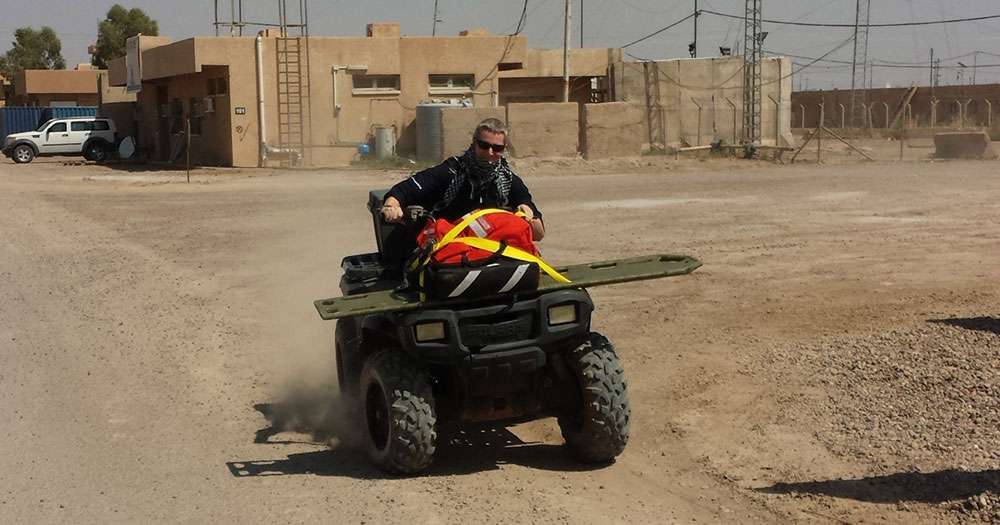
Testing the Quad in Iraq. Used for hard to reach locations.
Probably one of the worst incidents I went to was when a mortar round went astray and hit a house. When we landed there were already some British army medics on the scene and they just kept bringing all these casualties to the helicopter. There were six children involved and one unfortunately died on the scene and the others were seriously injured. That always stays in my mind mainly because right at the end a young British army medic handed me a sleeping bag, which contained several body parts. At the time I didn’t know what it was inside. I think naively she thought we could sew them back.
There were numerous incidents though and they all seem to blend into one really. Guys would be regularly injured by IED (improvised explosive device) as they patrolled along and it often amputated their legs.
As the war progressed the blasts got bigger and we would see above-knee amputations and really high-level amputations sometimes. One poor guy had 4 limbs missing which was pretty horrific. I am unsure if he survived to be honest. He was an American medic actually.
Although it’s horrific on one level I really quite enjoyed the work. Professionally it’s fantastic because of what’s involved. In the real-world ambulance work can be quite frustrating. Some people call us to deal with things that just need some common sense. When in Afghanistan it was nice to do what I was trained for, mixing the military and medical side of things.
While away on tours it was always difficult ringing home, as it’s hard to explain the things we have done. It becomes such a daily occurrence that somehow it becomes normal. It may sound a bit odd but if you’re doing this kind of work day in and day out you get used to it. The first few times it was shocking, really absolutely shocking. I never really had nightmares though plenty of my colleagues and friends had them. I felt I was doing something important, helping and being positive in a negative environment. If someone’s been seriously injured we would keep them focused on us and help them to the best of our ability. Usually the casualty couldn’t hear us because of all the noise. It’s not like the movies when they sit there, chatting with no legs. They have lost a huge amount of blood, they’re not really conscious, often on the edge of death. Our main aim is to try and get control of their breathing and stop the bleeding. At the time we were quite revolutionary because we took blood products forward.
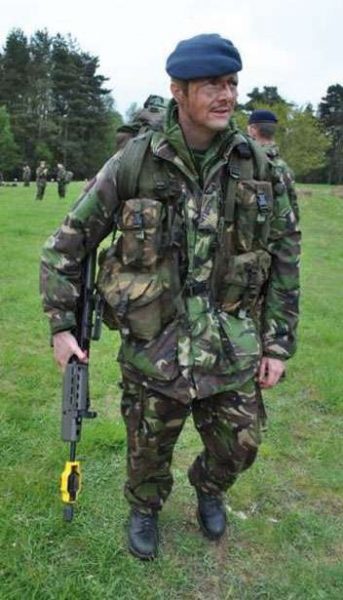
Pre-deployment training in the UK prior to leaving for Afghanistan
I am not naïve enough to think it was just me. We were part of a system. There are ground medics, us and the hospital. We were the M.E.R.T team, the helicopter medics basically. The ground medics do their bit. They act straightaway to stop the bleeding, give pain relief and call for evacuation. We would then fly in and work to the next level. Then the hospital team at Bastion take over. After surgery they are often flown home via the RAF critical care teams. Sometimes they can be back in the UK within 24 hours of injury.
We were still armed of course as there’s a lot of shooting going on. The aircraft would often take hits. Whether they were shrapnel or bullets I don’t know but it is fitted with an armoured tub, so it can take some punishment.
It’s a very stressful environment. As I said before we pretty much walked around as a 4 for 3 months because of being on call and needing to be in vicinity of each other. But we would do physical training together, eat meals together, and sleep in the same tents. We could get a bit on top of each other sometimes and it was hard to get some space but in general we built decent relationships and I still value their friendships now. The Military is very good at man management and making teams work well together.
When I came home I was full of it and wanted to go again. I had accumulated leave for training and was on leave when I found out a guy on the team who replaced me, had suffered an ear injury. He had damaged his ear drum and couldn’t fly. I was asked to return and I agreed.
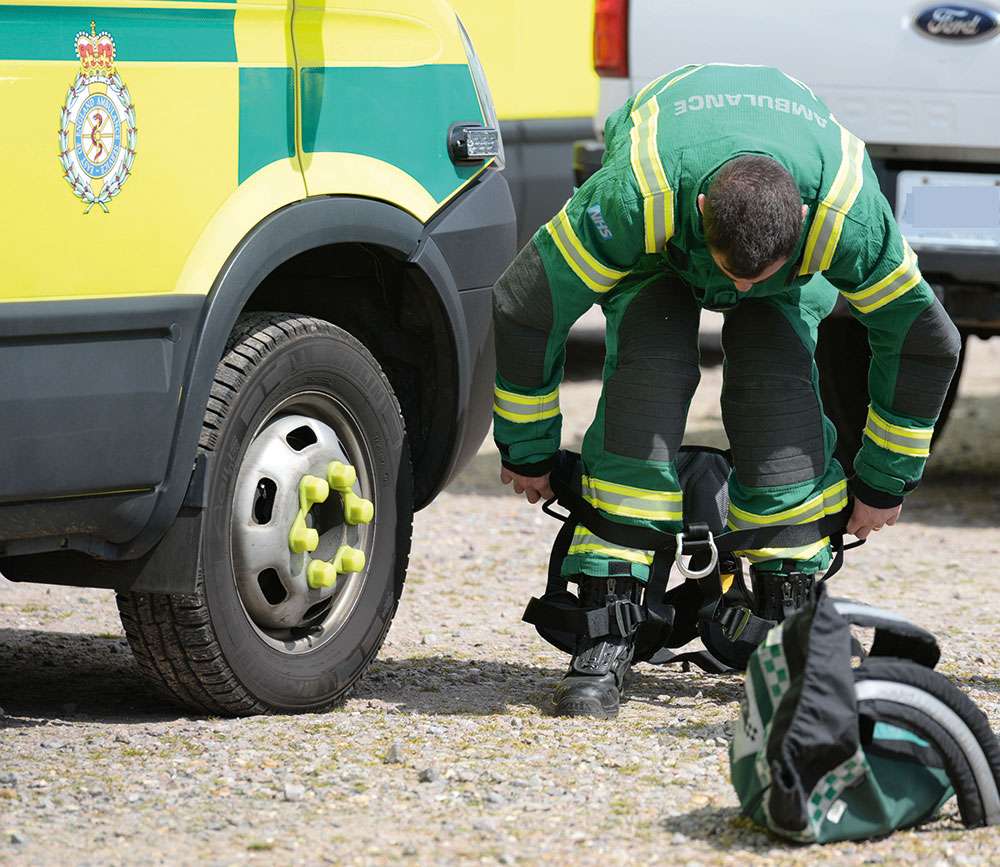
Working in the Ambulance Service in the UK
When you are deployed your pay is matched to your civilian pay rate. You don’t go out there for the money. As a Reserve you are called up. For me the whole time I was called up for was 15 months in the end – training, deployment, leave and back.
After returning to civilian life I struggled to settle back into conventional ambulance work. So I took the decision to explore some alternative paramedic roles. I worked within the private security sector for 2 years, both as a team medic and on a static site in Iraq, where I had a medical role. They’re known as remote medicine teams. In the security teams we supplied medical support for the client and the static site work is more routine.
At that time, I started to gain those extra skill sets looking into minor injury and illness, which then basically lead me to this job at the Cranleigh Health Centre. I just didn’t want to go back to ambulance work really.
Morale in the ambulance service is quite low and that’s mainly because it’s misused as a service. Often we’re dealing with things that aren’t appropriate. Very little of it is what the public perceive as life or death stuff. Most of it is social problems – the elderly falling in their own home or care homes and domestic violence sometimes. It’s very frustrating because we’re fairly powerless in these situations to do anything and are just stuck in the middle of 2 parties. At 2 o’clock in the morning there’s no one else really to hand over to and we get dumped with a lot of stuff. Especially after coming back from Afghanistan I thought I can’t do this anymore. I need to do something else.
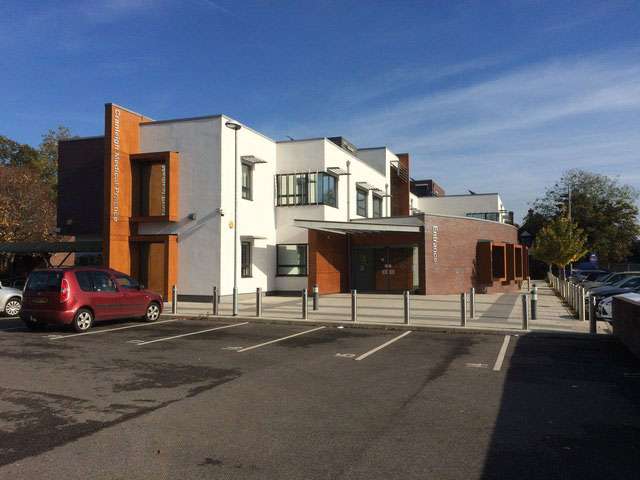
Cranleigh Health Centre
Now I’m working in Cranleigh Health Centre as a Paramedic Practitioner, it’s challenging in a different way. It’s a different type of patient group and some are quite complex medically and I am learning all the time and is stimulating in that sense. Ultimately, it’s minor illness and injury with some acute illness occasionally. Whereas before I was running around, here I can actually deal with what arises. Here I can access medicines and refer to other agencies that I couldn’t on the ambulance. I can liaise with their GP and actually get things done. This Health Centre is an excellent Practice. The staff here are incredibly supportive, it’s a forward-thinking Practice. It’s got pharmacists, paramedics, physician’s assistants as well as GP’s.
I am currently working towards my Masters, in order to develop my skill set. It will take a good 3-4 years. At the start of this month paramedic prescribing is being legalised. Paramedics will soon be able to undertake a course in independently prescribing. I hope to complete this as part of my Masters programme. When that’s completed, it should make for a more efficient service. Looking to the future I am quite happy here and I’ll take one day at a time.











